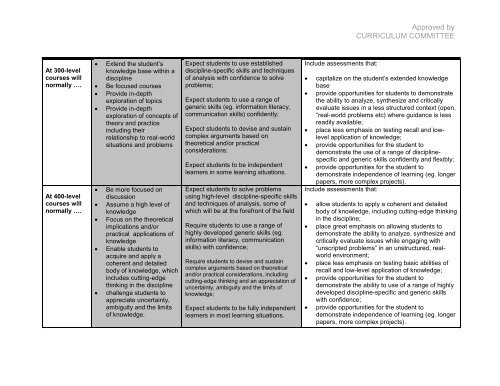Level Descriptors: Generic Guidelines
Level Descriptors: Generic Guidelines Level Descriptors: Generic Guidelines
Approved byCURRICULUM COMMITTEEAt 300-levelcourses willnormally ….At 400-levelcourses willnormally ….Extend the student’sknowledge base within adisciplineBe focused coursesProvide in-depthexploration of topicsProvide in-depthexploration of concepts oftheory and practiceincluding theirrelationship to real-worldsituations and problemsBe more focused ondiscussionAssume a high level ofknowledgeFocus on the theoreticalimplications and/orpractical applications ofknowledgeEnable students toacquire and apply acoherent and detailedbody of knowledge, whichincludes cutting-edgethinking in the disciplinechallenge students toappreciate uncertainty,ambiguity and the limitsof knowledge.Expect students to use establisheddiscipline-specific skills and techniquesof analysis with confidence to solveproblems;Expect students to use a range ofgeneric skills (eg. information literacy,communication skills) confidently;Expect students to devise and sustaincomplex arguments based ontheoretical and/or practicalconsiderations;Expect students to be independentlearners in some learning situations.Expect students to solve problemsusing high-level discipline-specific skillsand techniques of analysis, some ofwhich will be at the forefront of the fieldRequire students to use a range ofhighly developed generic skills (eg.information literacy, communicationskills) with confidence;Require students to devise and sustaincomplex arguments based on theoreticaland/or practical considerations, includingcutting-edge thinking and an appreciation ofuncertainty, ambiguity and the limits ofknowledge;Expect students to be fully independentlearners in most learning situations.Include assessments that: capitalize on the student’s extended knowledgebase provide opportunities for students to demonstratethe ability to analyze, synthesize and criticallyevaluate issues in a less structured context (open,“real-world problems etc) where guidance is lessreadily available; place less emphasis on testing recall and lowlevelapplication of knowledge; provide opportunities for the student todemonstrate the use of a range of disciplinespecificand generic skills confidently and flexibly; provide opportunities for the student todemonstrate independence of learning (eg. longerpapers, more complex projects).Include assessments that:allow students to apply a coherent and detailedbody of knowledge, including cutting-edge thinkingin the discipline;place great emphasis on allowing students todemonstrate the ability to analyze, synthesize andcritically evaluate issues while engaging with“unscripted problems” in an unstructured, realworldenvironment;place less emphasis on testing basic abilities ofrecall and low-level application of knowledge;provide opportunities for the student todemonstrate the ability to use of a range of highlydeveloped discipline-specific and generic skillswith confidence;provide opportunities for the student todemonstrate independence of learning (eg. longerpapers, more complex projects).
Approved byCURRICULUM COMMITTEE
Approved byCURRICULUM COMMITTEEAt 300-levelcourses willnormally ….At 400-levelcourses willnormally ….Extend the student’sknowledge base within adisciplineBe focused coursesProvide in-depthexploration of topicsProvide in-depthexploration of concepts oftheory and practiceincluding theirrelationship to real-worldsituations and problemsBe more focused ondiscussionAssume a high level ofknowledgeFocus on the theoreticalimplications and/orpractical applications ofknowledgeEnable students toacquire and apply acoherent and detailedbody of knowledge, whichincludes cutting-edgethinking in the disciplinechallenge students toappreciate uncertainty,ambiguity and the limitsof knowledge.Expect students to use establisheddiscipline-specific skills and techniquesof analysis with confidence to solveproblems;Expect students to use a range ofgeneric skills (eg. information literacy,communication skills) confidently;Expect students to devise and sustaincomplex arguments based ontheoretical and/or practicalconsiderations;Expect students to be independentlearners in some learning situations.Expect students to solve problemsusing high-level discipline-specific skillsand techniques of analysis, some ofwhich will be at the forefront of the fieldRequire students to use a range ofhighly developed generic skills (eg.information literacy, communicationskills) with confidence;Require students to devise and sustaincomplex arguments based on theoreticaland/or practical considerations, includingcutting-edge thinking and an appreciation ofuncertainty, ambiguity and the limits ofknowledge;Expect students to be fully independentlearners in most learning situations.Include assessments that: capitalize on the student’s extended knowledgebase provide opportunities for students to demonstratethe ability to analyze, synthesize and criticallyevaluate issues in a less structured context (open,“real-world problems etc) where guidance is lessreadily available; place less emphasis on testing recall and lowlevelapplication of knowledge; provide opportunities for the student todemonstrate the use of a range of disciplinespecificand generic skills confidently and flexibly; provide opportunities for the student todemonstrate independence of learning (eg. longerpapers, more complex projects).Include assessments that:allow students to apply a coherent and detailedbody of knowledge, including cutting-edge thinkingin the discipline;place great emphasis on allowing students todemonstrate the ability to analyze, synthesize andcritically evaluate issues while engaging with“unscripted problems” in an unstructured, realworldenvironment;place less emphasis on testing basic abilities ofrecall and low-level application of knowledge;provide opportunities for the student todemonstrate the ability to use of a range of highlydeveloped discipline-specific and generic skillswith confidence;provide opportunities for the student todemonstrate independence of learning (eg. longerpapers, more complex projects).



